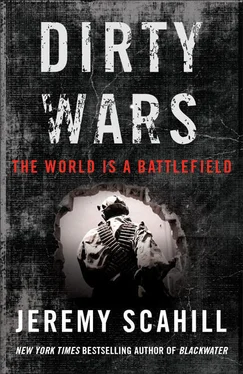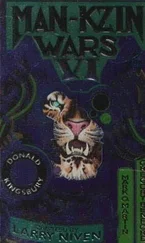
23. “If Your Son Does Not Come to Us, He Will Be Killed by the Americans”
YEMEN, 2007–2009—During Anwar Awlaki’s time in solitary confinement in a Yemeni prison, al Qaeda in Yemen had made a comeback. While the Bush administration’s civilian leadership largely ignored the resurgence, JSOC was tracking al Qaeda’s new organization in Yemen closely. On March 27, 2007, a Yemeni military unit in the province of Hadramaut discovered a US spy drone that had washed up on the shore of the Arabian Sea. The “Scan Eagle” was an unarmed aerial reconnaissance vehicle that had been launched off the USS Ashland, which deployed to the area in early 2007 to support Combined Task Force 150’s counterterrorism operations in the Horn of Africa. Human rights groups also alleged that the Ashland was being used by US forces as a floating prison to hold al Qaeda suspects picked up in the region. The day after the Yemeni military recovered the aircraft, President Saleh spoke to the US chargé d’affaires in Yemen, who tried to assure Saleh that the Scan Eagle had crashed in the sea and had not entered Yemeni territory. Saleh told the US official he didn’t buy that story but promised that Yemen would not “turn this into an international incident,” according to a US diplomatic cable sent after the phone call, and “would instruct [Yemeni] government officials not to comment.” Instead, Saleh’s government put out a cover story that helped bolster Saleh’s propaganda campaign against Iran. On March 29, official Yemeni media outlets reported that the Yemeni military had shot down an Iranian “spy plane” after consulting with “multinational forces” in the region. Saleh “could have taken the opportunity to score political points by appearing tough in public against the United States, but chose instead to blame Iran,” according to the US cable. The crashed drone was an omen of things to come.
As al Qaeda regrouped in Yemen, it began to carry out a series of small-scale actions, primarily in Marib Province, the site of the 2002 US drone strike that killed Harithi, including suicide attacks against oil and gas facilities. In March 2007, they assassinated the chief criminal investigator in Marib, Ali Mahmud al Qasaylah, for his alleged role in the drone strike. In an audiotaped message, Wuhayshi’s deputy, Qasim al Rimi, announced that Wuhayshi was officially the new head of al Qaeda in Yemen. In the message, Rimi vowed the group would continue to take revenge on those responsible for the US drone strike. Two weeks after Rimi’s tape was released, suicide bombers attacked a convoy of Spanish tourists in Marib, killing eight of them, along with two Yemeni drivers.
After eighteen months in prison, Awlaki reentered a world in which the US wars he had grown to militantly oppose had spread. Now, it seemed, war was coming to Yemen. As JSOC and the CIA intensified their operations, Awlaki’s story became like a mirror image. When Awlaki was freed in late 2007, he did not go into hiding, as the US government alleged. He went home to his family in Sana’a and tried to figure out a way to support them and to continue his preaching.
In an interview days after his release, Awlaki was asked if he would return to the United States or Britain to preach. “Well, I would like to travel. However, not until the US drops whatever unknown charges it has against me,” he replied. “The truth of the matter is I am not banned from return to the US. I left the US on my own accord and refuse to return by my own choice,” Awlaki said later. “In fact the opposite is true. The US consul encouraged me to return to the US during his visit to me while I was incarcerated. Alhamdulillah [thanks be to God], Allah has blessed me with living in a blessed land by the witness of Rasulullah [the prophet]. Why should I replace that with life in the US? But I refuse to even visit the US because the US government is not to be trusted as they are liars just like their media.” As to what he would do next, Awlaki said, “I have a few opportunities open at the moment and I haven’t chosen yet among them. I’m still sort of studying the situation at the time being.”
In early 2008, the Internet became Awlaki’s digital mosque, where he could reach Muslims across the globe. In February, he established his own website, www.Anwar-AlAwlaki.com, titled “Imam Anwar’s Blog.” He set up a Facebook page, which drew thousands of subscribers. “In the old times it used to take a few days to travel, for example, from Makkah to Madina which are only 450 km apart. Now we can communicate all over the globe within seconds; text, audio and video, all within seconds. So I would like to tell all of the brothers out there whom I personally know and whom I spent memorable time with: Assalamu alaykum and insha Allah I will never forget you,” Awlaki wrote in his first blog post. “And to those whom I grew to know through these modern means of communication but the circumstances have separated me from meeting them, nevertheless, I still feel a bond with them and I love them for the sake of Allah because they have chosen to follow Islam: Assalamu alaykum, and if we don’t meet in this world then we ask Allah to make us of those who would meet while reclining on the thrones of Paradise.”
Awlaki’s website had a vibrant comment section, and he built up a large online community to whom he was very responsive. The humanity—and an attention to mundane discussion—Awlaki showed in these discussions complicated the cartoonish descriptions of him in Western media and helped to explain his appeal, particularly to some Western Muslims. In one post headlined “Do You Like Cheese?” Awlaki posed a question: “Cheese is great. So if you are a fan of cheese you might be asking yourself the question, is cheese made by non-Muslims allowed or not?” In another blog post, Awlaki addressed Koran-compliant financial practices for Muslims living in the United States and warned against taking out home mortgages. “If you are a person whom Allah has bestowed wealth upon then you should avoid owning property in the US and you should diversify out of the dollar into gold and silver,” he wrote. “In addition to this being the prudent thing to do from a financial point of view, it is also the recommended thing to do Islamicly. Muslims should not be supporting the economy of a nation that is fighting them. Finally, for those who are contemplating purchasing a home in the US based on mortgage which is a clear form of Riba (usury) they should fear Allah.”
But Awlaki’s posts also bristled with hostility to the United States and showed a clear radicalization of his own politics. Completely gone was any moderate tone about the United States or democracy. “Muslims do not try to infiltrate the system and work from within. It is just not our way. It is the way of the Jews and the munafiqeen (hypocrites) but not the way of the Muslims,” he wrote in an August 2008 blog post. “As Muslims we should not subject Islam to the whims of the people, if they chose it we implement it, if they don’t we accept the choice of the masses. Our position is that we will implement the rule of Allah on earth by the tip of the sword whether the masses like it or not. We will not subject sharia rule to popularity contests. Rasulullah (the prophet) says: I was sent with the sword until Allah alone is worshiped. That path, the path of Rasulullah, is the path we should follow.” He added: “Today the Muslim world is under occupation and the statements of our scholars are clear that it becomes fardh ayn (a binding duty) on every able Muslim to fight to free the Muslim land. When something is fardh ayn it is fardh ayn. You cannot theorize or hypothesize otherwise. The ruling is clear and the implications of it are clear.” Awlaki praised the Taliban in Afghanistan and the Islamic Courts Union in Somalia as two “successful examples, even though far from perfect,” of a system of Islamic governance. Jihad, he wrote, “is what [military theorist Carl von] Clausewitz would refer to as ‘total war’ but with the Islamic rules of engagement. It is a battle in the battlefield and a battle for the hearts and minds of the people.”
Читать дальше













